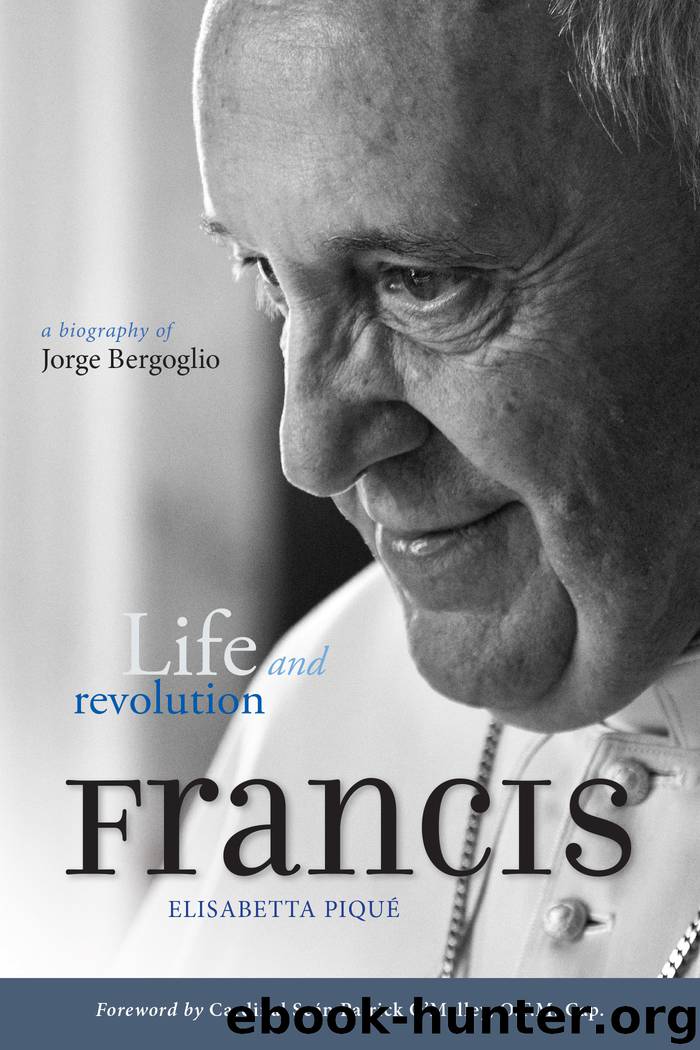Pope Francis: Life and Revolution by Elisabetta Piqué

Author:Elisabetta Piqué [Piqué, Elisabetta]
Language: eng
Format: epub
Tags: BIO018000, BIOGRAPHY & AUTOBIOGRAPHY/Religious, REL108030, RELIGION / Christian Church/Leadership, REL010000, RELIGION / Christianity/Catholic, REL012040, RELIGION / Christian Life/Inspirational
Publisher: Loyola Press
Published: 2014-10-14T16:00:00+00:00
12
Bergoglio and the Media
It doesn’t often happen that somebody calls you up on the phone to thank you for an article. That’s what Jorge Bergoglio does to me at the end of February 2001, when I meet him during an interview for La Nación. The Archbishop of Buenos Aires has come to Rome to be made a Cardinal by John Paul II at the consistory of February 21 of that year.
According to what they tell me at the paper, he is not well disposed toward the press and is famous for not giving interviews; but when he is about to receive the red hat, the Archbishop of Buenos Aires makes an exception. As usual he is staying at the Casa Internazionale at 70 Via della Scrofa. I call him to arrange our meeting. The Archbishop of Buenos Aires, age sixty-four—I must confess that I know absolutely nothing about him except that he’s a Jesuit—asks me shyly if I could please let him know in advance the subjects we will discuss.
I immediately send him a few lines by fax, presenting the topics I would like to talk about: how he feels a few days before the consistory (ceremony in which the pope creates new cardinals); what it means for Argentina to again have two cardinal-electors at a future conclave (another Argentinian, Jorge Mejía, working in the Roman Curia, is also to be created Cardinal); how he sees the Catholic Church in general and Argentina’s Church in particular; his vision for Argentina, which is experiencing difficult times and in fact would collapse and default on its debt a few months later, at the end of the same year.
The appointment is for Thursday, February 15, at 4:15 in the afternoon. Bergoglio receives me in an elegant room with a high ceiling and antique armchairs with damask upholstery, on the first floor of the Casa Internazionale. He seems nervous but is courteous. To break the ice, I tell him a little about myself, that I have recently become La Nación’s correspondent in Rome and the Vatican, that I’m not an expert on ecclesiastical matters but that I do a little bit of everything. I also cover other countries, the Middle East, Kosovo, wars and politics.
When I switch on my tape recorder and we start the interview, he gradually begins to relax. He pays careful attention to every word. He speaks in a direct and simple way; many of his sentences could serve as headlines. Bergoglio doesn’t have that superior, somewhat misogynistic attitude that I have noticed in some high-ranking prelates.
In spite of the difficult situation in Argentina, Bergoglio doesn’t lose hope. He says he foresees what he calls a “transversal generation”: men and women capable of forgetting which party they belong to, realizing that the country must be defended, rather than the “game preserve” of one’s own party and interests. “I invite young people to enter politics and become responsible: politics is one of the most important forms of charity. It means working for
Download
This site does not store any files on its server. We only index and link to content provided by other sites. Please contact the content providers to delete copyright contents if any and email us, we'll remove relevant links or contents immediately.
Resisting Happiness by Matthew Kelly(3341)
The Social Psychology of Inequality by Unknown(3031)
Day by Elie Wiesel(2785)
Designing Your Life by Bill Burnett(2748)
The Giving Tree by Shel Silverstein(2345)
Human Design by Chetan Parkyn(2075)
The Supreme Gift by Paulo Coelho(1979)
Angels of God: The Bible, the Church and the Heavenly Hosts by Mike Aquilina(1969)
Jesus of Nazareth by Joseph Ratzinger(1811)
Hostage to the Devil by Malachi Martin(1803)
Augustine: Conversions to Confessions by Robin Lane Fox(1774)
7 Secrets of Divine Mercy by Vinny Flynn(1746)
Dark Mysteries of the Vatican by H. Paul Jeffers(1723)
The Vatican Pimpernel by Brian Fleming(1703)
St. Thomas Aquinas by G. K. Chesterton(1635)
Saints & Angels by Doreen Virtue(1606)
The Ratline by Philippe Sands(1580)
My Daily Catholic Bible, NABRE by Thigpen Edited by Dr. Paul(1503)
Called to Life by Jacques Philippe(1481)
